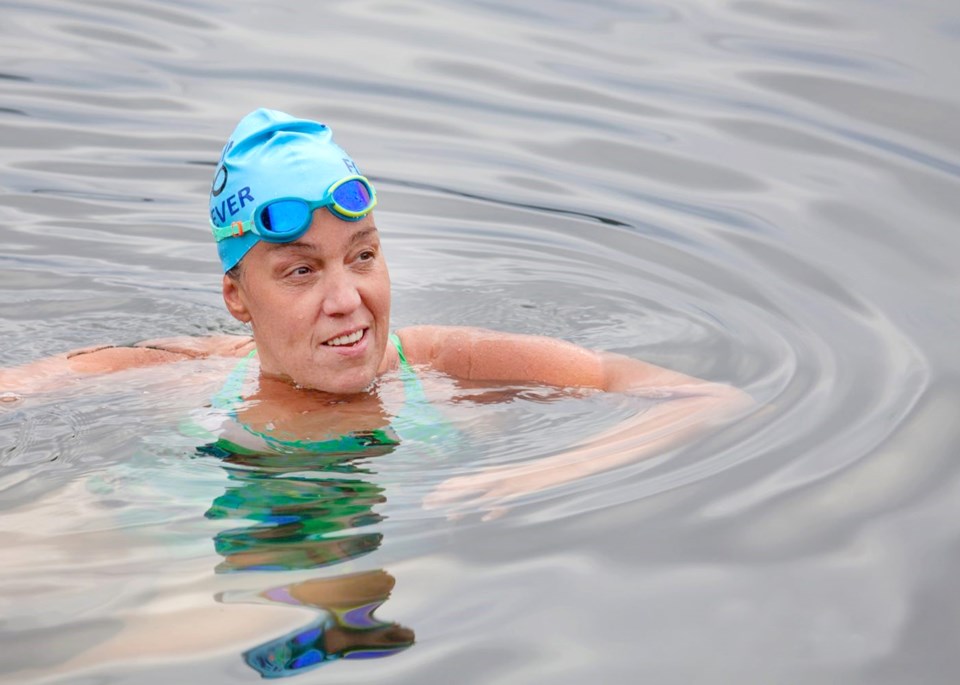Susan Simmons left swimming at the age of 15, tired of female competitive sports, and never thought she’d enter a pool again. Now, at the age of 53 – and not despite of, but because of, a diagnosis of multiple sclerosis – Simmons will be attempting the first-ever double-cross swim of the Juan de Fuca Strait.
Simmons was diagnosed with MS in her early 30s while she was living in North Vancouver. After abandoning swimming for almost 20 years, she started again and she credits the programs on the North Shore for helping her overcome barriers to swimming and getting her back in the water.
“The masters program at the North Shore rec centres is one of the best in Canada,” Simmons said.
Simmons has two big swims planned for the summer and the Juan de Fuca crossing was set to happen on Aug. 1. Unfortunately, due to high winds at around 30 knots, she and the three watercraft that will accompany her have postponed the trip – she hopes they’ll be on the water by Aug. 18 if not earlier. Because of the tides and currents, there are very few days in a month when it’s safe enough to attempt the marathon swim.
The swim will take about 24 hours. Simmons holds the record for fastest crossing of the Juan de Fuca – from Victoria to Port Angeles - at 10 hours, 6 minutes, which she completed last August.
This time, Simmons will cross the 33-kilometre strait – doing the front crawl – exit up to her knees stateside and then turn around and come back.
Before her MS diagnosis, it had been almost 20 years since Simmons competed as a swimmer and she didn’t have good memories from those days.
As a teenage girl, competitive swimming was socially debilitating.
“I find for girls in particular, we don’t know how to compete in a healthy way,” Simmons said.
Not only did Simmons develop body image issues with a broad-shouldered swimmer’s physique, but if she succeeded, she was shunned, if she lost, she was mocked.
“If you win, everyone hates you, if you lose, everyone makes fun of you,” Simmons said. “If I won, no one wanted to talk to me, especially boys.”
Simmons said the sports community needs to get better at transitioning young athletes into masters programs, because fitness is a lifelong pursuit.
“For me, I found marathon swimming,” she said.
She also believes that keeping fit by swimming and sticking to a vegan diet help her cope with multiple sclerosis.
“Fitness and nutrition for people living with MS will keep us healthy and active – just enjoying a better quality of life,” Simmons said.
Simmons credits her re-entry into swimming to her coach, Khosro Mansuri, and the masters program, which was free with a fitness membership.
“He was super supportive and very aware of my physical state,” Simmons said.
Mansuri coached her at the Harry Jerome Recreation Centre, but she’s also grateful to a second coach, Juan Gomez, as being instrumental to helping her in her swimming at Ron Andrews Recreation Centre. Both were part of the recreation program.
“Swimming has saved my life as a person living with MS,” Simmons said.
Simmons moved to Victoria about 10 years ago and that is when she started open-water swimming, first 1.5 kilometres and working up to 10 kilometres.
She is a “traditional” open water swimmer because she wears only a swimsuit, swim cap and goggles – no wetsuit.
On her Juan de Fuca swim, Simmons will be accompanied by three watercraft – a sailboat, a small motorized boat and a kayak. She has a safety plan that outlines what would happen in case of an emergency, and this has been viewed by the Canadian Coast Guard. The pilot will also be in constant contact with vessel traffic control that monitors traffic on the water.
Simmons is also raising awareness about the environment through her swimming and is attempting to swim across the Great Bear Sea over multiple swims.
During one leg last summer, her swim to Namu, a former fishing village that’s in disrepair and an environmental hazard, was interrupted by a humpback whale swimming directly below her.
While the environment is close to her heart, she wants to give hope to her community, those struggling with MS, and inspire them with her extreme swimming.
“I want to show the MS community that life doesn’t end with a diagnosis,” Simmons said.
Simmons’ website is withms4ms.com and when she is able to set out on her double cross of the Juan de Fuca, there will be a tracker on the site to show her progress.



